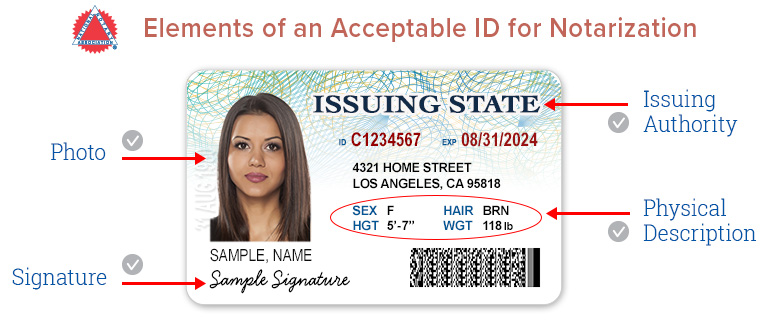Determine if an ID is Acceptable for Notarization
Some states specify the types of ID a Notary may accept to identify a signer but many states leave the determination of an ID's suitability up to the Notary.If your state does not specify what ID signers may use, the NNA recommends the Notary ask for identification documents issued by the state or federal government that contain a photograph, a physical description and the bearer’s signature. These elements provide a basis for comparison with the actual physical appearance and signature of the person requesting the notarization.

Acceptable Forms of Identification for Notary Services
- State-issued driver's license
- State-issued identification card
- U.S. passport issued by the U.S. Department of State
- U.S. military ID
- State, county and local government IDs
- Permanent resident card, or "green card," issued by the U.S. Citizenship and Immigration Services*
- Foreign passport*
- Driver's license officially issued in Mexico or Canada*
Although these are commonly accepted forms of ID, your state may have different requirements. Be sure to familiarize yourself with and follow your state's laws addressing acceptable signer identification.
Can Notaries Accept an Expired License as a Form of ID?
The answer depends on the state laws where the notarization is taking place. Some states require "current" ID and some states accept expired IDs if they were issued within the past five years. Because the laws in many states do not specify whether an ID has to be current, valid or unexpired, the NNA recommends accepting unexpired IDs as a professional best practice.If you're in a state that does not accept expired ID, there may be alternative methods of identifying a signer that your state does allow, such as using a credible witness. Read the Notary Bulletin for more detailed information about whether expired ID is acceptable in your state
What if a Signer's ID Looks Suspicious?
Getting a high-quality fake ID is easier than ever before, which makes spotting a fake ID more difficult. However, there are warning signs that you can look out for. If a photo doesn't closely resemble the signer or the card looks altered in any way, consider it a red flag and inspect the card thoroughly. Make sure the photo and physical description match the signer. Confirm all of the security measures your state includes on ID cards are present too.
Not all of these warning signs mean you're dealing with an impostor, though. People often change their name, gain or lose weight, cut or dye their hair and some have had cosmetic surgery or gender reassignment surgery. Learn how to handle name discrepancies and check out Notary Basics: How To Deal With Unreliable Or Suspicious ID for more details.
What if the Signer Does Not Have Identification?
A recent survey by the Brennan Center for Justice revealed that millions of American citizens including minors, the elderly, minorities, low income and homeless people don't have government-issued ID. In situations where a signer does not have acceptable ID or if you're uncertain about the ID, check your state laws regarding credible witnesses as a means of identification. View our free webinar to learn how Notaries can use credible witnesses to identify signers.
What Types of ID Are Not Acceptable?
Generally speaking, Social Security cards, birth or marriage certificates, credit cards, school IDs, library cards and temporary driver's licenses are not acceptable forms of ID for notarization purposes.
While some states are very strict about the forms of ID that can be used and others have general ID rules, many states leave it up to the Notary's judgment. Before making a decision, consider that you may need to defend your notarization in the future.
